Lulusan DKM/DVM Boleh Sambung Ijazah Sarjan Muda Tanpa SPM?
Maklumat Terkini – Tanpa SPM, lulusan DKM/DVM sekarang dah boleh sambung ke program ijazah sarjana muda di Universiti Awam (UA)
Nota: Sebelum ni, perlu kredit BM SPM & lulus Sejarah SPM.
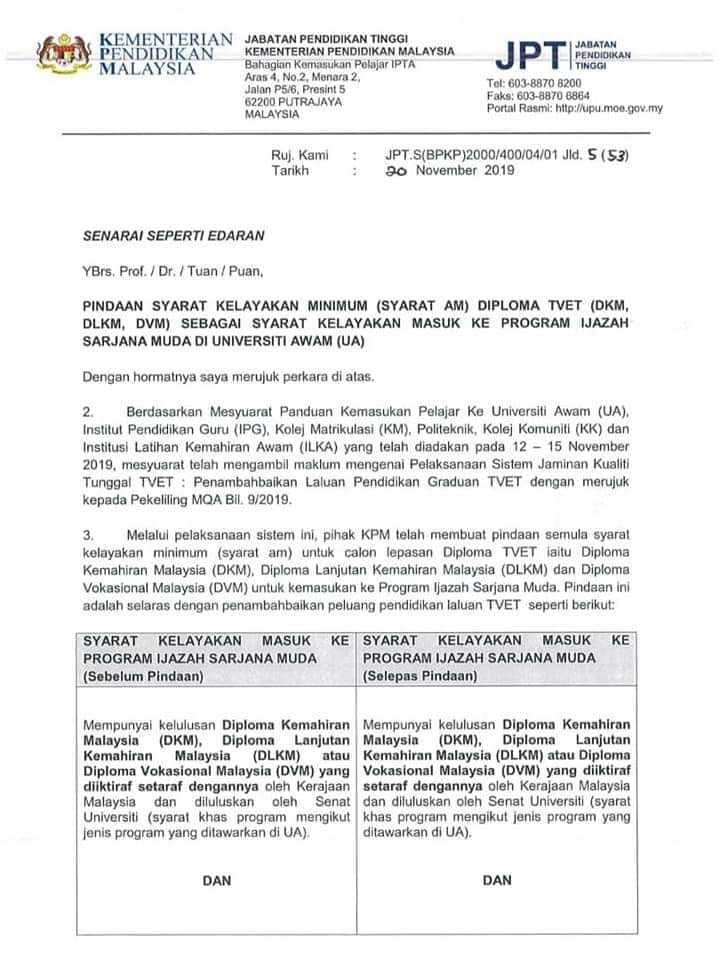
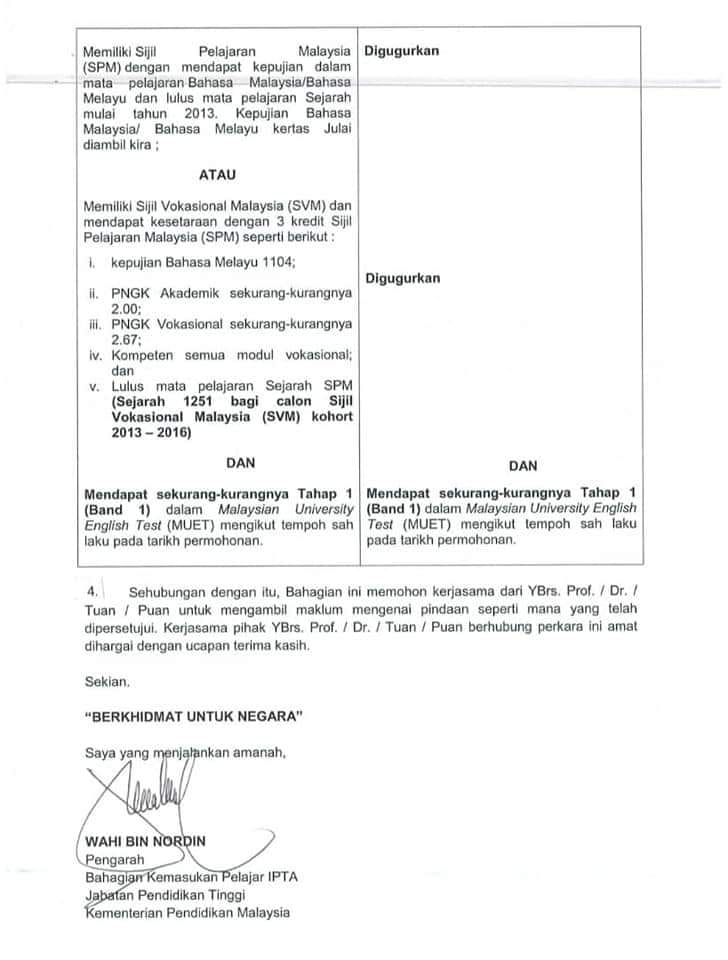
Maklumat Terkini – Tanpa SPM, lulusan DKM/DVM sekarang dah boleh sambung ke program ijazah sarjana muda di Universiti Awam (UA)
Nota: Sebelum ni, perlu kredit BM SPM & lulus Sejarah SPM.


PUTRAJAYA: Penawaran program pengajian Pendidikan Teknikal dan Latihan Vokasional (TVET) akan dikaji dan dijajarkan semula mengikut kehendak industri bagi menyediakan graduan berdasarkan bidang tumpuan ekonomi mengikut wilayah atau lokaliti yang dikenal pasti dalam Wawasan Kemakmuran Bersama (WKB) 2030.
Perdana Menteri, Tun Dr Mahathir Mohamad yang juga pemangku Menteri Pendidikan berkata, selari dengan Wawasan Kemakmuran Bersama, TVET dijadikan sebagai antara pemboleh daya yang dapat menyumbang ke arah pembentukan negara membangun yang makmur dan inklusif.
Bagi tahun 2020, katanya Kementerian Pendidikan (KPM) dan semua kementerian penyedia TVET yang lain akan memberi penekanan terhadap pelaksanaan Peta Strategi Pemerkasaan TVET yang telah dihasilkan oleh Jawatankuasa Kabinet Pemerkasaan TVET.
Ia bagi menghasilkan graduan TVET yang seimbang, holistik dan berciri keusahawanan seterusnya menjadi pekerja berkemahiran tinggi yang menyumbang terhadap produktiviti dan pertumbuhan ekonomi negara, katanya.
“Kesemua pihak terbabit perlu memastikan wawasan TVET yang diterajui industri bagi mengurangkan permasalahan ketidaksesuaian kemahiran, kebergantungan kepada buruh asing dan akhirnya menghasilkan graduan TVET yang memenuhi keperluan industri dapat kita capai,” katanya pada majlis amanat dan aspirasi bersama warga Kementerian Pendidikan di sini, hari ini.
Dalam pada itu, Dr Mahathir berkata bagi menyediakan murid mengharungi Revolusi Industri Keempat, KPM akan memastikan peningkatan pendidikan Sains, Teknologi, Kejuruteraan dan Matematik (STEM) dari pelbagai segi.
Peningkatan itu termasuklah bilangan murid yang mengambil mata pelajaran STEM, kemahiran penyampaian guru, aktiviti kolaboratif bersama pihak industri dan penglibatan ibu bapa dalam memupuk minat murid untuk mengambil STEM, katanya.
“Untuk menarik lebih ramai murid menyertai bidang STEM, mulai tahun ini, kementerian telah menyediakan lebih banyak opsyen untuk murid memilih mata pelajaran elektif di bawah pakej STEM selain sastera dan kemanusiaan,” katanya.
Dr Mahathir berkata Pelantar Pembelajaran Digital Kementerian yang dibangunkan pada 1 Julai 2019 akan terus digiat dan dimantapkan tahun ini sebagai pemangkin pengajaran dan pembelajaran digital dalam kalangan guru dan murid melalui kebolehcapaian bahan yang lebih mudah dan meluas.
“Kandungan kurikulum juga dirangka merangkumi elemen-elemen seperti Objek Rangkaian Internet (IoT), pengekodan, robotik dan data raya atau big data dalam mata pelajaran di sekolah rendah dan menengah untuk menarik minat murid dan memudahkan penguasaan ilmu yang hendak disampaikan,” katanya.
Sumber: BERNAMA
.JPG)
KUALA LUMPUR, Jan 18 — Empowering Technical and Vocational Education Training (TVET) by developing a more relevant new policy in implementing TVET’s agenda in line with industry needs was part of the Ministry of Human Resources’s plan throughout 2019.
This was outlined in the Ministry of Human Resource’s 2019 achievement report to strengthen the various sectors under the ministry led by M. Kulasegaran, while also committed to championing the rights of workers in the country.
Touching on issues related to workers including skills upgrading, TVET education, security, law and others in the 32-page report card, the Ministry of Human Resources is committed towards improving every aspect in line with fulfilling the promises contained in the Pakatan Harapan’s manifesto.
With a RM5.9 billion allocation via the 2020 Budget to place TVET in the main stream in the country, the ministry has begun to take step by establishing the TVET Single Quality Assurance System to be used by the Malaysian Qualifications Agency (MQA) and the Department of Skills Development (JPK) for the purpose of coordinating, monitoring and strengthening the TVET sector.
According to Kulasegaran, the new system is responsible for accrediting TVET programmes offered by public and private TVET institutions based on the Second Edition Of The Malaysia Qualification Framework (MQF 2.0) which was approved at the MQA Council Meeting in December 2017.
“The implementation of TVET quality assurance programme by MQA and JPK will be made based on the TVET Programme Accreditation Code of Practice approved by the Cabinet Meeting on Jan 31, 2019,” he said.
In line with the latest trend of Industrial Revolution (IR) 4.0 education or 4.0 era education, Kulasegaran said 35 National Occupational Skills Standards (NOSS) related to IR 4.0 were developed in 2018.
“To date, there are 42 NOSS related to IR 4.0 as a result of TVET’s National Master Plan Development Study towards a developed nation and the direction until 2030 will be used by policy makers in the process of reforming TVET implementation in Malaysia,” he said.
The efforts to empower the TVET field did not stop there when the ministry took the initiative to expand its field of study by signing a memorandum of understanding (MOU) with Private Secondary School (SUWA) on May 23, 2019 at Kolej Universiti New Era in Kajang.
“The collaboration between the two entities led to the ministry’s involvement in allowing SUWA students to attend training programmes at 32 Department of Human Resource Training Institutes (ILJTM) and enabling the ministry to consider loan applications or scholarships to eligible students for further study in TVET programmes, Vocational Training Officers (VTO) and so on,” he said. — Bernama

Berita baik untuk mereka yang mengambil DKM/DLKM-PPT dan sedang bekerja dalam bidang berkaitan bidang kursus sekurang-kurangnya 2 tahun. Kalau beminat untuk menambah ilmu pengetahuan di peringkat Ijazah Sarjana Muda bidang Teknologi, saya difahamkan pusat APEL sedia utk memproses permohonan anda bagi mengikuti program Sarjana Muda (Btech) di UTHM. Untuk maklumat lanjut sila hubungi APEL centre UTHM.
Dikongsi oleh Prof Madya Dr Razali Hassan, UTHM

PENGAMBILAN PELAJAR UNTUK INTAKE SEPTEMBER 2020
Jika anda lepasan DVM/DKM/ DLKM…..
Fakulti Pendidikan Teknikal dan Vokasional, UTHM membuat pengambilan pelajar bagi Intake September 2020 ke Ijazah Sarjana Muda Teknologi yang akan dibuka dari 24 Februari (12pm) hingga 17 April 2020 (11.59pm)
Permohonan melalui UPU Online.

Selain UTHM, Unimap, UTeM & UMP (yang lebih dikenali sebagai MTUN) yang menawarkan Ijazah Sarjana Muda bidang Teknologi (BTech) untuk lepasan DKM/DLKM (Tanpa SPM), anda juga boleh pilih:
1. IPTA atau IPTS lain yang menawarkan Ijazah Sarjana Muda bidang lain, juga tanpa SPM. Namun, masih banyak universiti yang perlukan kelulusan senat ataupun ujian APEL untuk kemasukan ke program Ijazah Sarjana Muda.
2. UniRazak (UR), KL bersama ISE Education (ISE) juga menawarkan program URise – Diploma Profesional & Eksekutif Bachelor Pengurusan Industri, KHAS untuk pemegang/graduan TVET/SKM/DKM/DLKM (juga tak perlu SPM DAN tak perlu ujian APEL).
Program URise ini membolehkan ANDA, graduan TVET/SKM/DKM/DLKM:
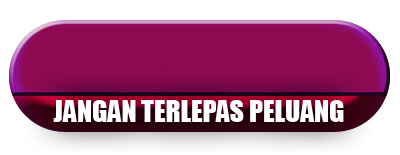
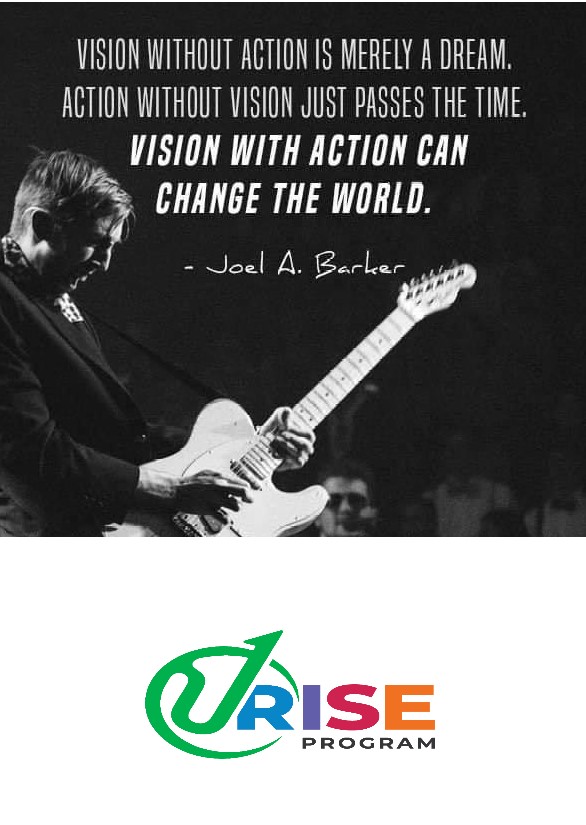
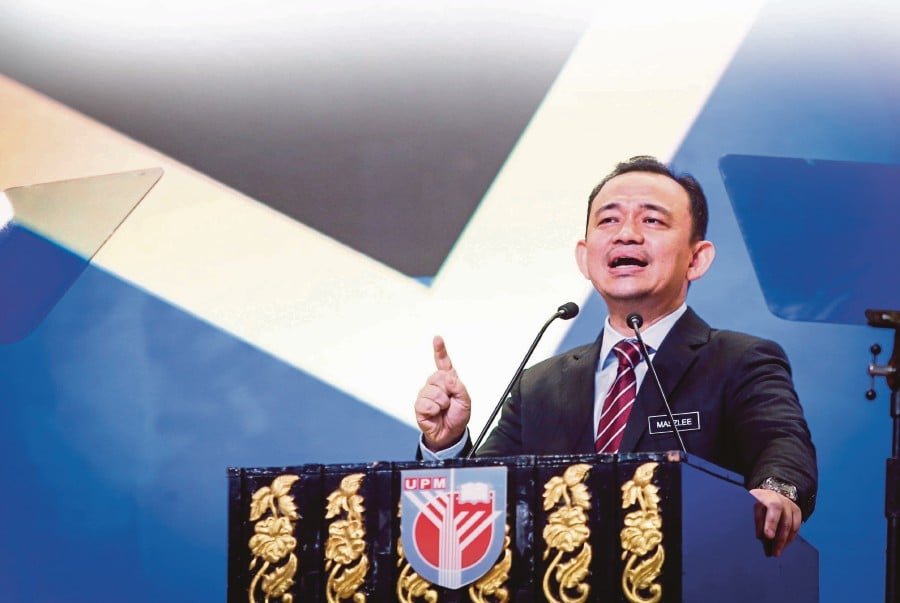
WITH the year fast drawing to a close, Higher ED looks back at the highlights and events that have shaped and influenced the tertiary education space.
This year, Malaysia took great strides to provide inclusivity and quality education to various levels of the society.
Increased pathways were created for access into education at various higher education institutions (HEIs). There was a keen focus on making tertiary education provide graduates with relevant skills and knowledge that would fit both industry demands and society needs as well as push further the pursuit of knowledge.
These were all drawn up via a clear framework stipulated in the Education Minister’s 2019 Mandate that was unveiled in January where four key directions were cited for higher education ― quality, autonomy, collaboration and internationalisation ― that aimed to bring back credibility to universities.
In preparing students to become society’s troubleshooters, *universities must create collaborations with various parties, such as schools, polytechnics and vocational colleges.
For Technical and Vocational Education and Training (TVET), the ministry would continue to improve its institutional capabilities to be on par with other educational pathways.
A harmonised accreditation system with quality assurance would be established to enable student mobility in TVET institutions.
The quality and delivery of TVET programmes would be increased to improve the skills of graduates through an industry-led approach, removing duplication of programmes and resources, increasing cost-effectiveness and expanding TVET funding.
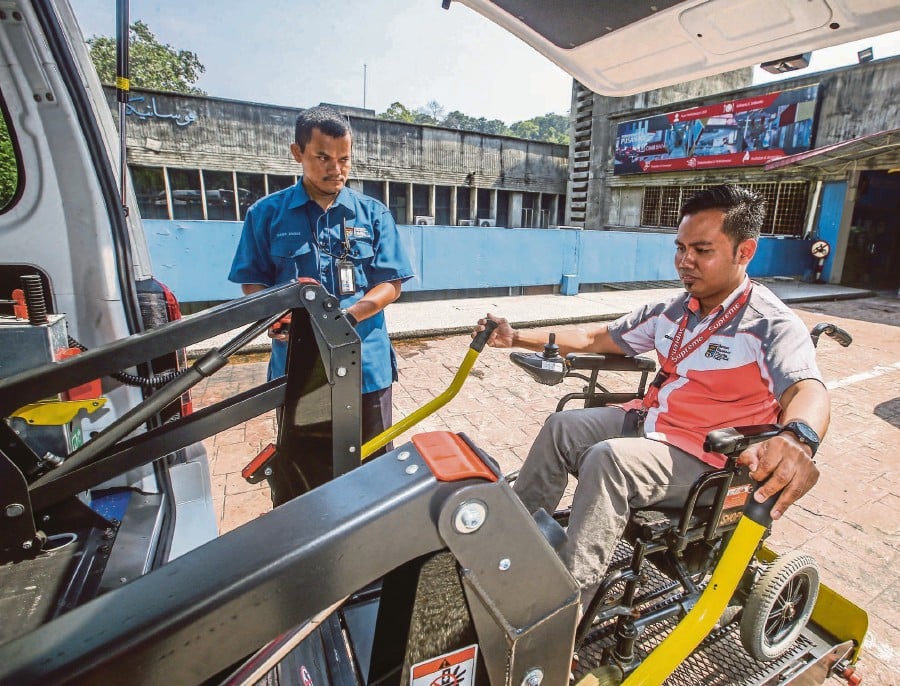
Plans on access, wider pathways for furthering education, autonomy and quality education were generally made good on as the year progressed.
SPECIAL ROUTES
The Education Ministry announced special pathways to public universities for four groups, namely, people with disabilities, athletes, Orang Asli and those in the B40 group in early March.
Students from these priority groups do not have to compete with the mainstream group to pursue their tertiary studies.
In line with the ministry’s Education for All concept, this initiative follows in the footsteps of developed countries in prioritising the admission of athletes into varsities.
Some 51,191 students from B40 group benefited from the special routes to public universities and special training institutes, of which 32,282 made it into public universities.
HEIGHTENED FOCUS ON TVET
To formulate more relevant policies to implement the TVET agenda according to industry needs, the TVET Empowerment Committee named Maszlee chairperson in May.
Later in August, the committee (JKKPTVET) was formed in line with the government’s hopes to make TVET a mainstream choice, instead of an alternative. The move is expected to help create a skilled workforce by 2030.
ALTERNATIVE POSTGRAD PATHWAYS
In July, the Malaysian Qualifications Agency revealed that there would soon be alternative pathways to provide opportunities for working adults and undergraduates to have a PhD qualification.
MQA chief executive officer Datuk Dr Rahmah Mohamed said the agency was carrying out an implementation study of the next phase of the Accreditation of Prior Experiential Learning (APEL) programme where work experience could be translated into a masters or doctoral degree, or speed up the process of getting a PhD.
Defined as a systematic process involving identification, documentation and assessment of prior experiential learning, the programme thus far has created access to certificate, diploma, bachelor’s degree and master’s degree study programmes to individuals with working experience but lack or are without proper academic qualifications.
MQA targeted to introduce APEL T-8 and APEL Q next year that would give access to PhD level qualifications. APEL T-8 is an extension of APEL A, which provides higher education opportunities based on a person’s working experience.
APEL Q awards master’s and doctoral level academic qualifications without class attendance.
The purpose of the various initiatives is to ensure there is a growth in the number of postgraduate degree holders, in line with the country’s aspiration of becoming a high-income nation.
BUDGET 2020
To level up human capital in the country, Finance Minister Lim Guan Eng, when tabling Budget 2020 in Parliament in October, announced an allocation of RM64.1 billion in 2020 for education ― reflecting the government’s commitment to provide quality education at different stages of life for the rakyat.
From the sum, a whopping RM5.9 billion is dedicated to mainstreaming TVET which include, among others, funding to strengthen the synergies between the public and private sectors through increased allocation for State Skills Development Centres and Public Skills Training Institutions as well as expanding pathways for TVET graduates to pursue further studies and secure jobs.
To encourage adult learning, Lim said the Employees Provident Fund will be allowed to facilitate the withdrawal for qualifications attained at certificate level, especially for accredited programmes that are in line with the nation’s IR4.0 aspirations.
The withdrawal scheme will include members’ parents and spouse.
A RM20 million allocation will be made available to be matched by another RM20 million from the Human Resource Development Fund towards having working adults take up professional certification examinations in fields relating to IR4.0.
Emphasis on learning opportunities under MARA and Yayasan Peneraju Pendidikan Bumiputera for low-income and rural bumiputeras through education institutions such as Kolej GIATMARA and Universiti Kuala Lumpur will be continued with an allocation of RM1.3 billion for education institutions under MARA for 2020, with a further RM2 billion allocated for student loans, benefiting 50,000 students. In addition, RM192 million is also allocated for professional certification programmes under Yayasan Peneraju.
To drive economic growth in the digital era, the government encourages the provision of technology scholarships, training and upskilling for digital skills for communities in need through the concept of Digital Social Responsibility (DSR).
DSR is the commitment by businesses to contribute to digital economic development while improving the digital skills of the future workforce.
Enhancing the research and development framework was also cited as a key strategy to drive economic growth in the new economy.
For that, Lim announced that the government will allocate RM30 million for R&D matching grants for collaborations with industry and academia to develop higher value-added downstream use of palm oil, specifically tocotrienol in pharmaceuticals and bio-jet fuel.
“To promote commercialisation of R&D from the public sector, research universities, beginning with UM, will establish a one-stop Innovation Office to transform intellectual property into commercially exploitable opportunities,” said Lim.
STUDY PATHWAYS
In November, the Education Ministry announced the replacement of the science/arts streaming system in upper secondary into a system where students can choose from 89 elective subjects grouped in two packages: STEM (Science, Technology, Engineering and Maths), and Arts and Humanities under the new Secondary Schools’ Standard Curriculum (Upper Secondary) or KSSM Menengah Atas.
This will give students a taste of what they might pursue at tertiary education level and maybe even get a headstart in their desired future careers.
In a briefing, Education Ministry deputy director-general (policies and development) Dr Habibah Abdul Rahim advised students to pick their subjects wisely because it paves the way for their future.
She added that the students can change subjects midway through schooling but noted that it will not be an easy feat because there will be a lot of catching up to do.
Source: Excerpts from https://www.nst.com.my/education (Focus on TVET)
Comment: * University Tun Abdul Razak (UniRazak), an IPTS, has signed an MOU with ISE Education Sdn Bhd, a JPK accredited institute for VTO & induction course programmes, to provide a unique pathway for TVET/SKM/DKM graduates & experienced TVET personnel to further studies in UniRazak, even without SPM.
The executive URise program (Professional Diploma & Executive Bachelor):
1. Acts as a bridging program to matriculate TVET/SKM/DKM graduates to university.
2. Provides an opportunity for TVET/SKM/DKM graduates to enhance career, especially to a managerial position with better leadership skills.
3. Elevates social status of TVET/SKM/DKM graduates and experienced skills personnel.


PUTRAJAYA: The education ministry today signed a strategic partnership agreement with four oil and gas (O&G) companies to widen job prospects for polytechnic and community college graduates.
The partnership is an initiative to provide opportunities for graduates in the O&G field by bringing the four industry players into a focus group.
The companies are EEW Malaysia, Dynac Group, Malaysia Marine Heavy Engineering, and Brooke Dockyard and Engineering Works.
Speaking at the signing ceremony, Education Minister Maszlee Malik said this is the first focus group under the initiative.
He said that by grouping businesses into such groups, it would be possible to address issues specific to the industry, achieve greater efficiency and drive better synergy in the initiative.
“Having focus is indeed a critical factor for any success, especially when we are moving towards having an industry-led and industry-certified framework for technical and vocational education and training.
“If the accountancy profession has ACCA, CIMA, MICPA and others, I hope today’s TVET O&G cluster will lead to a similarly dedicated group that strives to make education and training in the industry world-class and forward-looking,” he said.
The signing ceremony at Putrajaya International Convention Centre was attended by Thorsten Petermann, managing director of EEW Malaysia; Jasman Bongkek, Dynac Group CEO; Mashitah Wan Abdullah Sani, managing director and CEO of Malaysia Marine and Heavy Engineering; and Tajul Ariff, head of KL Office Operation, Brooke Dockyard & Engineering Works.
Also present were Abdul Rahman Mohamed Shariff from the Industrial Secretariat, TVET Cabinet Empowerment Committee, and Mohammad Naim Yaakub, director of the Polytechnic and Community College Department.

Vice-Chancellor Professor Datin Dr Samsinar Md Sidin said it would introduce the new programmes to ensure that students were prepared for the industry’s demands.
She hoped that Unirazak would be the first private university to cater to the 4IR.
“We will offer programmes that prepare our graduates to be a future-ready generation, hence we are looking not just within Malaysia but also to what is happening around the world.
“It is not just about programmes, but also the teaching and learning techniques, as well as skills.
“In order to achieve that, we have to be dynamic in terms of how we do things and I hope Unirazak would be able to do that for their students, as well as for the nation,” she said at the university’s 19th convocation here.
A total of 215 graduates from faculties of Bank Rakyat School of Business and Entrepreneurship, Tun Abdul Razak School of Government and Graduate School of Business received their graduation scrolls.
The ceremony was officiated by Chancellor Tun Ahmad Sarji Abdul Hamid, who presented the scrolls to the graduates.
When asked if the university was prepared to embrace the Science, Technology, Engineering, Arts and Mathematics programme, Samsinar said Unirazak was working closely with industries to obtain new content to include in its curriculum.
“We want these industry experts to come and teach our students as they are willing to learn beyond their programmes.”
Ahmad Sarji, in his speech, said the Fourth Industrial Revolution had been changing the world. He said Artificial intelligence, robotics, Big Data and the Internet of Things would collectively impact jobs and industries in the future.
“Unirazak has developed an Education 4.0 experience for students through the Unirazak Online Experience, better known as UROX, that rides on the Canvas System.
“This was introduced this year to all students and faculty members with the objective to expand teaching and learning at the university,” he said.
Source: https://www.nst.com.my/

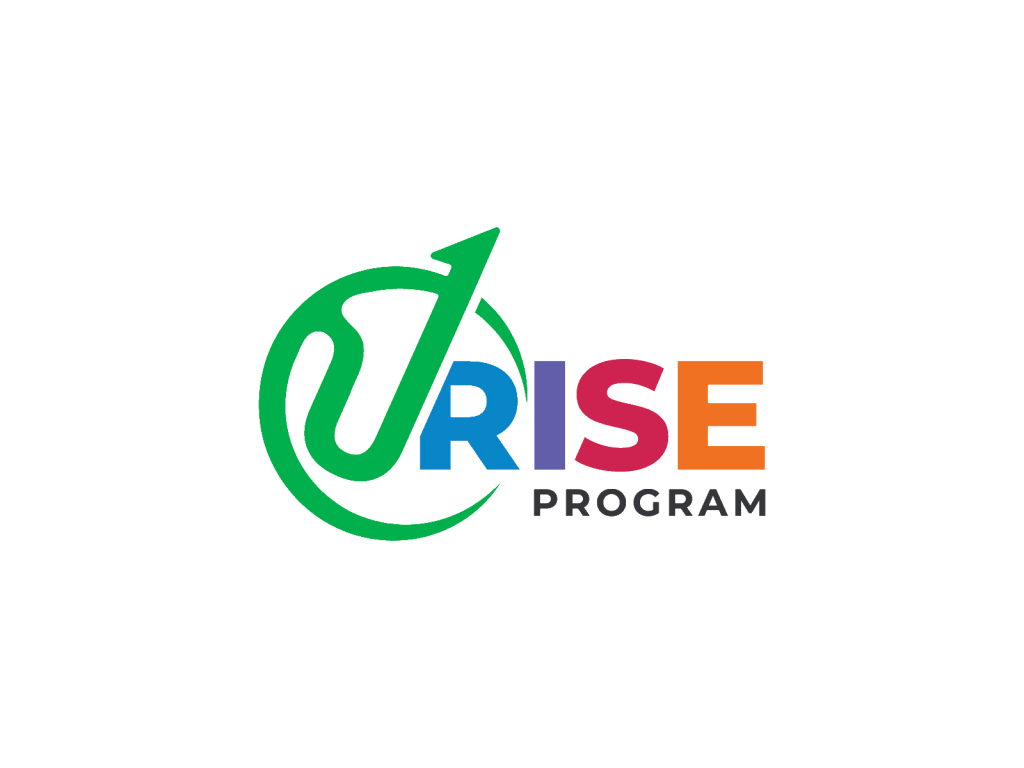
Comment: Do you know that Unirazak would soon have an URise Program offering Professional Diploma in Industrial Management (ProDip) & Executive Bachelor in Industrial Management (EBIM) that’s been created especially for TVET/SKM graduates?
It aims to:
1) Bridge TVET/SKM graduates to an MQA accredited Bachelor’s Degree or Masters Degree
2) Advance TVET/SKM graduates in their career with a Bachelor’s Degree, where most do not have a chance if they don’t have SPM with 3 credits, MQA Diploma or Diploma Kemahiran Malaysia (DKM).
3) Elevate TVET/SKM graduates’ social status.
If you’re interested to know further, kindly show your interest here